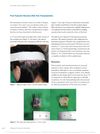 4 citations,
April 2020 in “Journal of Cosmetic Dermatology”
4 citations,
April 2020 in “Journal of Cosmetic Dermatology” High uric acid levels link to male pattern baldness, especially in young men.
 4 citations,
November 2014
4 citations,
November 2014 The skin protects the body, regulates temperature, senses touch, and makes vitamin D.
 4 citations,
October 2007 in “Dermatologic Clinics”
4 citations,
October 2007 in “Dermatologic Clinics” Glucocorticoids and sex hormones affect skin health, with potential for targeted treatments to minimize side effects and treat skin conditions.
[object Object]  4 citations,
January 1974 in “The BMJ”
4 citations,
January 1974 in “The BMJ” All medications can cause skin rashes, often without a clear cause, and better tests are needed to identify these drug-related skin issues.
 3 citations,
July 2021 in “Life science alliance”
3 citations,
July 2021 in “Life science alliance” PNKP is essential for keeping adult mouse progenitor cells healthy and growing normally.
 3 citations,
June 2004 in “Alternative and Complementary Therapies”
3 citations,
June 2004 in “Alternative and Complementary Therapies” The document concludes that hair loss is influenced by genetics and other factors, and while treatments like finasteride can help, they have limitations and side effects.
 3 citations,
July 1996 in “Clinics in Dermatology”
3 citations,
July 1996 in “Clinics in Dermatology” Cytokines are important for immune responses and treating diseases, but they can cause side effects like fever and skin issues.
 2 citations,
July 2019 in “PLOS ONE”
2 citations,
July 2019 in “PLOS ONE” Certain genetic variations are linked to higher liver enzyme levels in patients treated for chronic hepatitis C with specific drugs.
 2 citations,
September 2010 in “Journal of the Dermatology Nurses’ Association”
2 citations,
September 2010 in “Journal of the Dermatology Nurses’ Association” Transplant patients on immunosuppressive medications have a higher risk of skin cancer, and managing this involves balancing medication with cancer risk.
 2 citations,
January 2002 in “Hormone Research in Paediatrics”
2 citations,
January 2002 in “Hormone Research in Paediatrics” Molecular diagnostics help identify genetic defects causing endocrine diseases, improving diagnosis and treatment options.
 2 citations,
February 2014 in “Animal Biotechnology”
2 citations,
February 2014 in “Animal Biotechnology” The PTGER2 gene is highly active in Cashmere goat skin and its activity changes with the hair growth cycle.
 1 citations,
August 2023 in “Cutis”
1 citations,
August 2023 in “Cutis” Low ferritin levels can indicate iron deficiency as a cause of hair loss.
 1 citations,
January 2023 in “Revista da Associação Médica Brasileira”
1 citations,
January 2023 in “Revista da Associação Médica Brasileira” Experts agree on the need for standardized definitions and education for post-COVID-19 conditions.
 1 citations,
May 2021 in “Annals of the rheumatic diseases”
1 citations,
May 2021 in “Annals of the rheumatic diseases” Tofacitinib is a promising treatment for children with rheumatic diseases.
 1 citations,
January 2020 in “Elsevier eBooks”
1 citations,
January 2020 in “Elsevier eBooks” Forensic medicine is crucial for justice and needs continuous innovation and technology integration.
 1 citations,
November 2018 in “Elsevier eBooks”
1 citations,
November 2018 in “Elsevier eBooks” The document concludes that transplantology has evolved with improved techniques and materials, making transplants more successful and expanding the types of transplants possible.
 1 citations,
October 2013 in “BMJ”
1 citations,
October 2013 in “BMJ” A man's sudden hair loss and color change to white was diagnosed as alopecia areata and it improved on its own after six months.
 1 citations,
August 2015 in “Dermatologic Surgery”
1 citations,
August 2015 in “Dermatologic Surgery” A woman's chronic head pain after hair transplant surgery was cured by removing a post-traumatic neuroma.

Gender-specific analysis could improve treatment for childhood systemic lupus erythematosus.
 April 2024 in “Research Square (Research Square)”
April 2024 in “Research Square (Research Square)” Selenium supplements can help improve symptoms and metabolic markers in lupus patients.
 April 2024 in “Cell death and disease”
April 2024 in “Cell death and disease” Long COVID causes various long-term health issues and needs better awareness and treatment.

New insights into cell communication in psoriasis suggest innovative drug treatments.
 January 2024 in “Regenerative Biomaterials”
January 2024 in “Regenerative Biomaterials” Metal organic frameworks-based scaffolds show promise for tissue repair due to their unique properties.
 January 2024 in “Theranostics”
January 2024 in “Theranostics” Exosomes from special stem cells help treat ulcerative colitis by reducing inflammation and stress.
 December 2023 in “Malahayati International Journal of Nursing and Health Science”
December 2023 in “Malahayati International Journal of Nursing and Health Science” Chemotherapy in children often causes hair loss, nausea, vomiting, and mood swings.
 November 2023 in “Regenerative Biomaterials”
November 2023 in “Regenerative Biomaterials” The new adhesive seals wounds quickly, works well in wet conditions, and helps with healing.
[object Object]  October 2023 in “Research Square (Research Square)”
October 2023 in “Research Square (Research Square)” Oxidative stress is linked to mild patchy alopecia areata.
 September 2023 in “Frontiers in medicine”
September 2023 in “Frontiers in medicine” The mTOR signaling pathway is crucial for hair health and targeting it may lead to new hair loss treatments.
 May 2023 in “International journal of pharmaceutical sciences and medicine”
May 2023 in “International journal of pharmaceutical sciences and medicine” Sunflower oil was found to promote hair growth in mice with hormone-induced hair loss.
 April 2023 in “Research Square (Research Square)”
April 2023 in “Research Square (Research Square)” Lower GPX4 mRNA levels are linked to higher disease activity and symptoms in lupus patients.






























